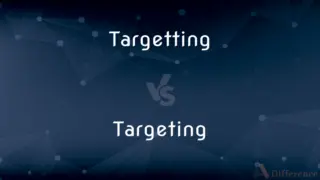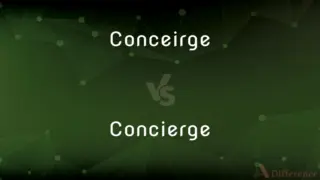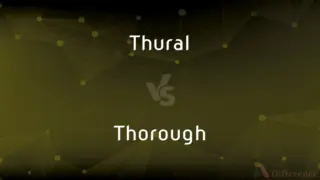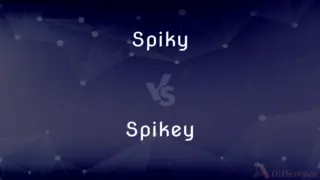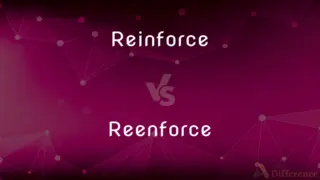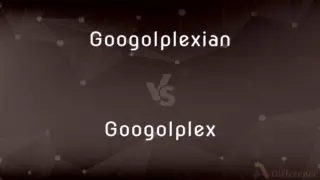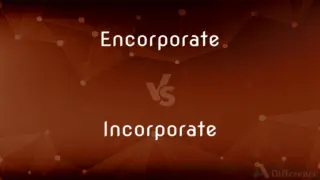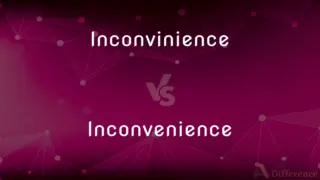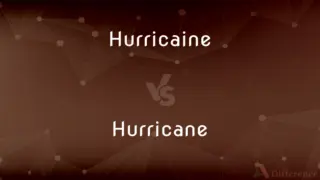Semantical vs. Semantic — Which is Correct Spelling?
Edited by Sumaia Saeed — By Munazza Shafiq — Updated on April 24, 2024
Semantical is the incorrect spelling of semantic. Semantic refers to the meaning or the interpretation of words, phrases, and sentences.
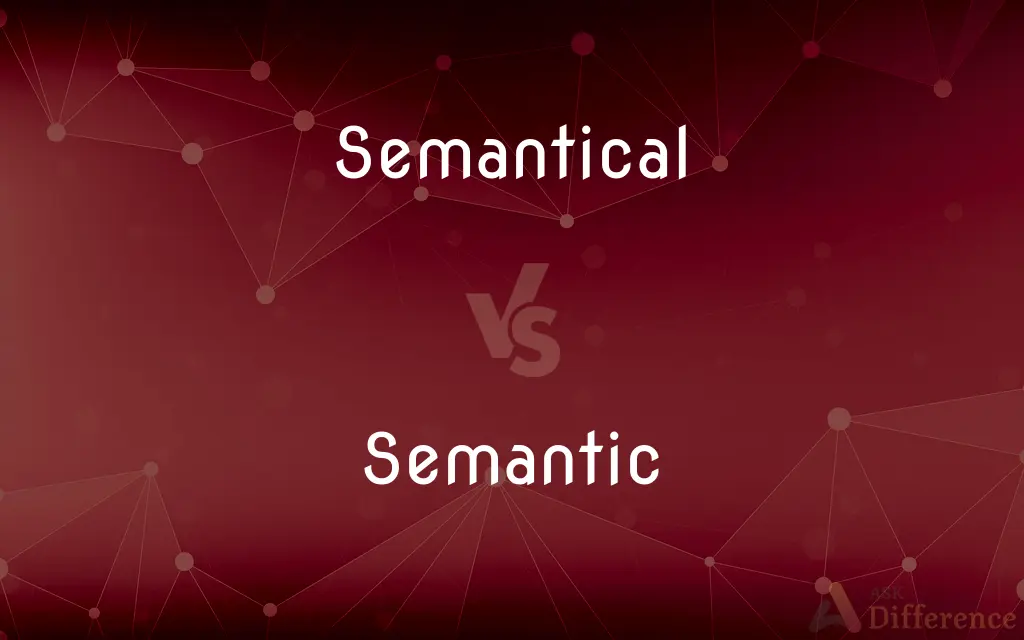
Table of Contents
Which is correct: Semantical or Semantic
How to spell Semantic?

Semantical
Incorrect Spelling

Semantic
Correct Spelling
ADVERTISEMENT
Key Differences
Think of "semantic" as pertaining directly to meaning—the simpler form for a complex concept.
Semantic directly relates to "semantics," the study of meaning, without needing an additional 'al' to be grammatically correct.
Semantical is a less common and often considered incorrect variant of semantic.
Recall that adjectives describing fields of study often end in 'ic' not 'ical', like "classic" and "algebraic."
Remember that "semantic" aligns with other similar adjectives like "automatic" and "systematic" that do not include an extra 'al' at the end.
ADVERTISEMENT
How Do You Spell Semantic Correctly?
Incorrect: He studies the semantical structure of languages.
Correct: He studies the semantic structure of languages.
Incorrect: Is there a semantical difference between these terms?
Correct: Is there a semantic difference between these terms?
Incorrect: The semantical analysis seems flawed.
Correct: The semantic analysis seems flawed.
Incorrect: I made a semantical error in my explanation.
Correct: I made a semantic error in my explanation.
Incorrect: Your semantical interpretation is incorrect.
Correct: Your semantic interpretation is incorrect.
Semantic Definitions
Concerning the meanings of words, phrases, sentences, and symbols.
Semantic confusion often arises from poorly defined terms.
Pertaining to semantics, which studies the meanings of words and their relationships.
Semantic changes in language can indicate evolving cultural values.
Involving the use of meaning to achieve understanding.
Semantic technologies enable more effective data management.
Of or relating to meaning, especially meaning in language.
Of, relating to, or according to the science of semantics.
Of or relating to semantics or the meanings of words.
Reflecting intended structure and meaning.
Petty or trivial; (of a person or statement) quibbling, niggling.
(linguistics) In such writing systems as the Chinese writing system, the portion of a phono-semantic character that provides an indication of its meaning; contrasted with phonetic.
Pertaining to the meanings of words.
Of or pertaining to semantics.
Of or relating to the study of meaning and changes of meaning;
Semantic analysis
Relating to meaning in language or logic.
Semantic analysis helps understand the meaning of words in context.
Referring to the branch of linguistics that studies meaning.
He specialized in semantic theory during his graduate studies.
Semantic Meaning in a Sentence
Semantic networks visually represent the relationships between concepts.
Semantic understanding is crucial for language learning.
Semantic barriers can impede communication across cultures.
Effective communication relies on clear semantic content.
Semantic fields group words related by meaning.
Semantic ambiguity can lead to misunderstandings in conversations.
Semantic analysis is a common task in natural language processing.
Semantic theories contribute to developments in artificial intelligence.
Semantic search engines interpret the meaning behind user queries.
Semantic HTML uses tags that convey meaning about webpage content.
Semantic arguments focus on the meanings and implications of statements.
Semantic roles help clarify sentence structures in many languages.
Children develop semantic skills as they learn to use language.
Semantic cues are hints that help clarify the meaning of communication.
Semantic processing involves interpreting language at the level of meaning.
Semantic memory stores information on the meanings of words.
Semantic properties of words influence their grammatical behavior.
Semantic links connect related concepts across different documents.
Semantic tags in programming provide information about the content of elements.
Semantic mapping is a strategy to visually organize information by meaning.
Semantic web technologies aim to create a more intelligent and meaningful web.
Semantic saturation occurs when a word is repeated until it loses meaning.
Semantic interpretation varies across different cultures and languages.
Semantic differential scales measure connotative meaning of concepts.
Semantic knowledge encompasses understanding word meanings and relationships.
Semantic Idioms & Phrases
Semantic field
A set of words grouped by meaning.
Ocean, sea, and river belong to the same semantic field.
Semantic noise
Interference in communication due to ambiguities in word meanings.
Semantic noise often complicates legal discussions.
Semantic argument
A dispute focused on the meaning of words.
The debate turned into a semantic argument about the definition of justice.
Semantic memory
A cognitive structure that stores general knowledge about the world.
Semantic memory helps us remember that Paris is the capital of France.
Semantic gap
A lack of understanding or information between different groups or systems.
Bridging the semantic gap between generations can improve communication.
Semantic satiation
The phenomenon where repetition causes a word to temporarily lose meaning.
Repeating butter multiple times led to semantic satiation.
Semantic change
The evolution of word meanings over time.
The word awful underwent semantic change, evolving from inspiring wonder to very bad.
Semantic link
A connection made between different concepts based on meaning.
Semantic links tie the concept of apple with fruit and healthy.
Semantic feature
An aspect of meaning that a linguistic unit can have.
Semantic features of the word bachelor include male and unmarried.
Semantic priming
The effect in which exposure to one word can influence the response to another word.
In semantic priming, reading doctor speeds up recognition of the word nurse.
Semantic markers
Cues that indicate the meaning and use of words.
Semantic markers in language guide interpretation and translation.
Semantic layer
In technology, a layer that interprets data into business terms.
The semantic layer of the database simplifies complex data queries.
Semantic network
A graphical representation of knowledge in networks of meaning.
Semantic networks are useful in artificial intelligence to mimic human understanding.
Semantic web
A web of data that enables machines to understand the semantics, or meaning, of information.
The semantic web enhances internet technology by enabling data connectivity in a standardized way.
Semantic analysis
The process of interpreting meaning in language.
Linguists perform semantic analysis to understand language patterns.
Semantic differential
A technique to measure the connotative meaning of objects.
Semantic differential is used in surveys to assess people's attitudes.
Semantic orientation
The direction of meaning a word or phrase takes in a specific context.
Semantic orientation affects how listeners interpret statements.
Semantic density
The richness of meaning associated with a text or speech segment.
Poetry often has high semantic density due to its use of symbolism and metaphor.
Semantic search
Search technology that seeks to understand the contextual meaning of user queries.
Semantic search improves the accuracy of search engine results.
Semantic role
The function a word or phrase fulfills in a sentence, based on its meaning.
In the sentence She gave him a book, she is the agent in the semantic role.
Common Curiosities
How is semantic used in a sentence?
Semantic analysis is essential for understanding language structure.
How many syllables are in semantic?
Semantic has three syllables.
What is a stressed syllable in semantic?
The first syllable is stressed in semantic.
What is the singular form of semantic?
The singular form is semantic.
Why is it called semantic?
"Semantic" comes from the French "sémantique," derived from Greek "semantikos," meaning "significant" or "having meaning," relating to signs, symbols, or meaning.
How do we divide semantic into syllables?
Semantic is divided into syllables as se-man-tic.
What is the verb form of semantic?
Semantic is an adjective; it does not have a verb form.
Is semantic an adverb?
No, semantic is not an adverb.
What is the root word of semantic?
The root word of semantic is the Greek word "sema," meaning sign or symbol.
What part of speech is semantic?
Semantic is an adjective.
What is the plural form of semantic?
Semantic does not have a plural form; it is used the same way in singular and plural contexts.
Is semantic a vowel or consonant?
Semantic is a word; it begins with a consonant.
Is the semantic term a metaphor?
Semantic can be involved in metaphoric language but is not itself a metaphor.
Is the word semantic Gerund?
No, semantic is an adjective; it does not have a gerund form.
What is the pronunciation of semantic?
Semantic is pronounced as /sɪˈmæntɪk/.
Is semantic a negative or positive word?
Semantic is neutral; it does not inherently carry a negative or positive connotation.
Is semantic a collective noun?
No, semantic is not a collective noun.
Is the word “semantic” a Direct object or an Indirect object?
Semantic, being an adjective, is neither a direct nor an indirect object.
What is another term for semantic?
Another term for semantic is "meaning-related."
Which determiner is used with semantic?
Determiners such as "a," "an," or "the" can be used with semantic depending on the context.
Which vowel is used before semantic?
The vowel "a" can be used before semantic when needed in a phrase, as in "a semantic analysis."
Which conjunction is used with semantic?
Conjunctions such as "and" and "or" are used with semantic, as in "semantic and syntactic structures" or "semantic or pragmatic aspects."
What is the opposite of semantic?
The opposite of semantic could be non-semantic, referring to aspects unrelated to meaning.
Is semantic a noun or adjective?
Semantic is an adjective.
Is semantic an abstract noun?
No, semantic is an adjective.
Is semantic a countable noun?
Semantic is not a noun; it is an adjective.
Is the word semantic imperative?
No, semantic as an adjective does not form imperative commands.
Which preposition is used with semantic?
Prepositions like "in," "of," and "for" are commonly used with semantic, as in "in semantic context," "of semantic importance," and "for semantic clarity."
Which article is used with semantic?
The article "the" is commonly used with semantic, as in "the semantic field of a word."
Share Your Discovery

Previous Comparison
Hoaky vs. Hokey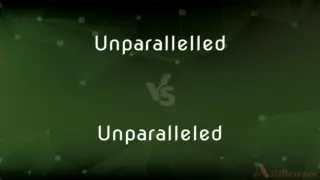
Next Comparison
Unparallelled vs. UnparalleledAuthor Spotlight
Written by
Munazza ShafiqEdited by
Sumaia Saeed

